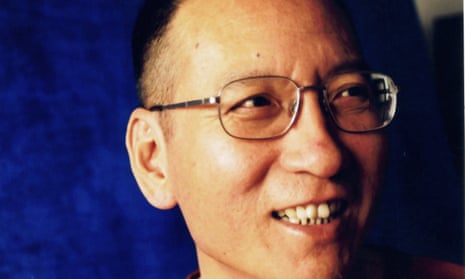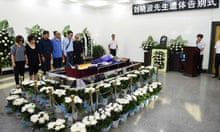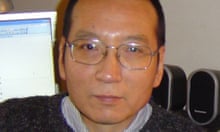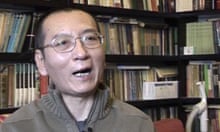China is facing a barrage of international criticism for its treatment of the Nobel laureate and democracy campaigner Liu Xiaobo, who died at the age of 61 on Thursday.
Liu, who championed non-violent resistance as a way of overcoming “forceful tyranny”, had been serving an 11-year jail sentence for demanding an end to one-party rule when he was diagnosed with late-stage liver cancer in May.
He died of multiple organ failure while under guard at a hospital in north-east China, making him the first Nobel peace prize winner to die in custody since German pacifist Carl von Ossietzky, the 1935 recipient, who died under surveillance after years confined to Nazi concentration camps.
News of Liu’s death sparked an immediate outpouring of international mourning and condemnation. His peaceful activism and biting criticism of one-party rule meant he had spent almost a quarter of his life behind bars.
The German chancellor, Angela Merkel, paid tribute to “a courageous fighter for civil rights and freedom of opinion”.
The US secretary of state, Rex Tillerson, said he mourned the loss of a man who had dedicated “his life to the betterment of his country and humankind, and to the pursuit of justice and liberty”.
The leader of the Norwegian Nobel Committee, which awards the prize, said the Chinese government – which had stopped Liu travelling abroad for treatment despite appeals from world leaders – bore “a heavy responsibility for his premature death”.
“We find it deeply disturbing that Liu Xiaobo was not transferred to a facility where he could receive adequate medical treatment before he became terminally ill,” said Berit Reiss-Andersen.
The British foreign secretary, Boris Johnson, said he was deeply saddened by the “huge loss” of the “lifelong campaigner for democracy, human rights and peace” and attacked Beijing for denying Liu and his family the chance to seek medical treatment overseas.
“Liu Xiaobo should have been allowed to choose his own medical treatment overseas, which the Chinese authorities repeatedly denied him. This was wrong and I now urge them to lift all restrictions on his widow, Liu Xia.”
One of the most forceful attacks on the authoritarian regime of China’s president, Xi Jinping, came from his Taiwanese counterpart, Tsai Ing-wen, who paid tribute to a “human rights warrior”.
Tsai said Liu had striven to transform China into a nation where human rights and the rule of law were respected. “This was Liu Xiaobo’s Chinese dream,” Tsai said, alluding to Xi’s central propaganda slogan.
“We hope that the Chinese authorities can show confidence in engaging in political reform so that the Chinese people can enjoy the God-given rights of freedom and democracy … Only through democracy, in which every Chinese person has freedom and respect, can China truly become a proud and important country.”
Liu Xiaobo was famed for his Gandhian “no enemies” philosophy – but there was rage as well as grief among his friends as news of his death spread.
“I hate this government,” said the author and activist Tienchi Martin-Liao, breaking down in tears as she learned of her friend’s death. “It is not only sadness – it is fury. How can a regime treat a person like Liu Xiaobo like this?
“This is unbearable. This will go down in history. No one should forget what this government and the Xi Jinping administration has done. It is unforgivable.”
The writer and activist Mo Zhixu, said he felt “bitter hatred”. “It is so cruel and inhuman.”
Hu Ping, a friend of almost three decades who edits a pro-democracy journal called the Beijing Spring, said: “Liu Xiaobo is immortal, no matter whether he is alive or dead. Liu Xiaobo is a man of greatness, a saint.”
Hu said his friend’s plight highlighted the bleak realities facing activists living under Xi, who has presided over what observers call the most severe political chill since the days following the 1989 Tiananmen crackdown.
“I think the situation in China now is deteriorating – and the way in which Liu has been treated clearly shows us what the current situation is, and how it goes beyond our imagination.”
Born in the northern province of Jilin in 1955, Liu was part of the first generation of Chinese students to go to university after they reopened following the upheaval of Mao Zedong’s Cultural Revolution. He studied Chinese literature and went on to become a revered writer and public intellectual.
When pro-democracy protests broke out in Beijing in the spring of 1989, Liu was lecturing in New York but decided to return despite having previously shown little interest in politics.
“He thought: ‘This is where I should be and this is where I can make a contribution. So I am going there’,” said Perry Link, a Chinese literature expert from the University of California, Riverside, who knew him.
Liu flew back to Beijing and headed to Tiananmen Square, where he played a central role in the protests. He led a hunger strike shortly before the 4 June military crackdown in which hundreds, possibly thousands of lives were lost. He was jailed for almost two years for his role in what Beijing called “counter-revolutionary” riots. The experience served as a political awakening that transformed Liu into a lifelong activist and champion of democracy.

Over the coming years Liu continued to speak out, despite two more stints behind bars, railing incessantly against China’s authoritarian regime in essays and interviews.The “crime” that led to Liu spending his final years behind bars was Charter 08, a 2008 declaration inspired by Charter 77, a manifesto published by Czechoslovakian dissidents in 1977. “The current system has become backward to the point that change cannot be avoided,” it warned, calling for an end to one-party rule.
Authorities did not approve. Hours before it was due to be published, Liu, who had been one of the document’s drafters, was detained at his Beijing home. The following year he was handed an 11-year sentence for “inciting subversion of state power”.
“The charter was the first public document since 1949 to dare to mention the end of one-party rule,” said Link. “But of course the problem with having an influence is that the crackdown has been effective. A lot of young people don’t know about the charter and don’t know about Liu Xiaobo now.”
In 2010, Liu was awarded the Nobel peace prize for his “long and non-violent struggle for fundamental human rights in China”. He was represented at the award ceremony by an empty chair. When he was informed of his victory he reportedly said: “I dedicate this prize to the lost souls of 4 June,” in reference to the victims of the Tiananmen massacre.
Human rights and democracy campaigners saw Liu’s Nobel prize as a triumph for their cause. But for his wife, the poet and artist Liu Xia, with whom he had fallen in love during the 1990s, it was a catastrophe. She was immediately placed under house arrest and has spent recent years living in almost total isolation, under constant surveillance.
“She is a wonderful woman. A really wonderful woman,” says Jean-Philippe Béja, a French academic and longstanding friend. “I don’t even dare to imagine how she feels now.”
Eva Pils, an expert in Chinese law and human rights from King’s College London, said Liu Xiaobo would be remembered for his “wise and forceful” style of political resistance. Supporters had been counting the days until his expected release from prison in 2019. “Now this is extremely disappointing,” she said. “Naturally, I, like many others, had been counting down to the time of his release. It’s so unfair.”
Link said Liu would be remembered as “a stubborn truth-teller” and someone who opened “the possibility of a different kind of China”.
“That is a lasting legacy. The model of how an independent intellectual stands up to the state will be admired if it is not completely obliterated.”
Béja said Liu’s ideas would continue to inspire, long after his death. “It’s always very hard to evaluate the impact of a thinker or of an actor but I am sure that – despite all the efforts by the party – he won’t be forgotten.”
Additional reporting by Wang Zhen








